Automation that Inspires: Value Provided by the Daifuku GroupIshizaka Inc. Learning from Industrial Waste and Creating a Sustainable Society
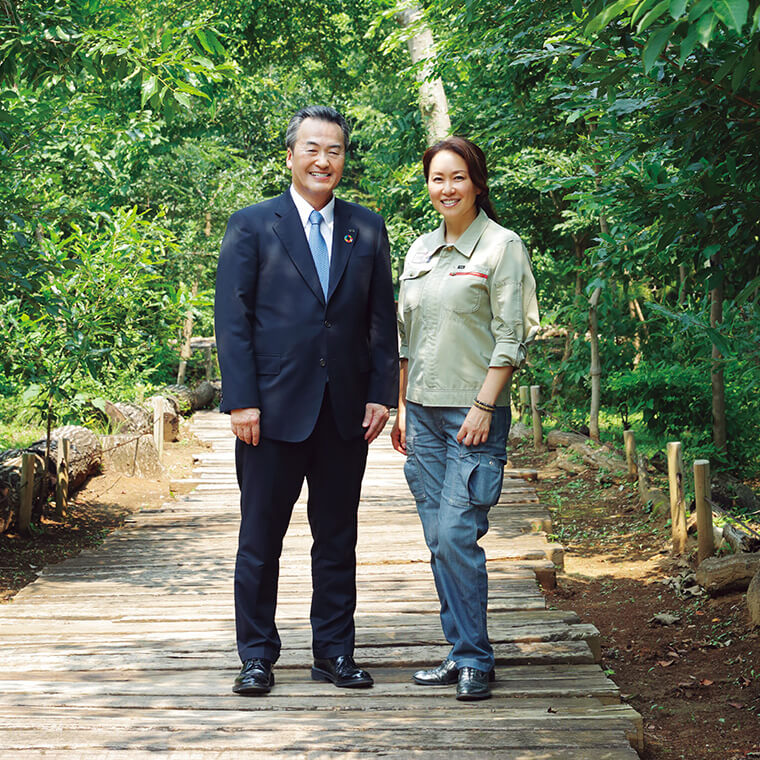
(right) Noriko Ishizaka, Representative Director, Ishizaka Inc.
Santome Konjaku Mura, an environmental education facility rich in natural beauty, straddles the boundary between Miyoshi and Tokorozawa in Saitama Prefecture. Its satoyama landscape, redolent of the good old days of rural Japan, has been brought back to life by Ishizaka Inc., a company in the industrial waste treatment business. Local residents love to go and relax at the facility, and inside it, Ishizaka's treatment plant, which has transformed the image of industrial waste, attracts a steady stream of visitors. Ishizaka's second-generation president, Noriko Ishizaka, has inherited the aspirations of the company's founder. She and Daifuku president Hiroshi Geshiro exchanged ideas on how to engage with society.
Geshiro: It was the awards ceremony for Zaikai magazine's 61st Management Awards that first led me to your writings. Amidst a string of controversies triggered by news in the media, the story of how you built and revived relationships of mutual trust with local residents through steady clean-up activities, the regeneration of satoyama (agricultural and forestry environment between mountains and arable land, where people co-exist with nature), and internal reforms was an absolute marvel.
I also saw you featured in TV programs and the like, and I really wanted to pay your company a visit someday. When I finally had the chance to look around your satoyama and plant, it confirmed my feeling that you're doing something very special.
Ishizaka: Thank you. Our company doesn't make visible products, so we think it's important to offer guided tours of our plant and share information with the public via the media. Our efforts to regenerate satoyama began with cleaning up the area around our plant, and we have engaged in this initiative because we have ideas we want to communicate to the local community.
Geshiro: Communication is important, isn't it? We create opportunities for interaction with people from outside the company by offering guided tours of our factories, and we've also opened Hini Arata Kan, our comprehensive demo center, on the grounds of Shiga Works.
Nevertheless, we too are a company that provides behind-the-scenes support and are not particularly in the public gaze. I used to think it was fine to have a low profile if our growth continued, but not anymore. When Daifuku launched an endowed course at a university, I was stunned to discover that most of the students had never heard of us, and I decided that I wanted our company to be better known. When students eventually become working adults, their job may well bring them into contact with material handling. I hope they'll remember Daifuku at such times.
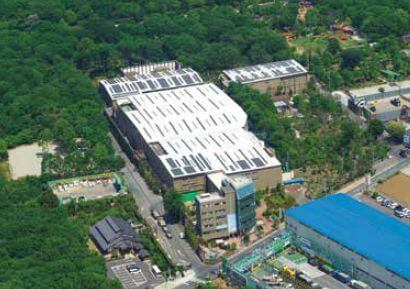
Idea of guided tours of the plant now leads to 40,000 visitors a year
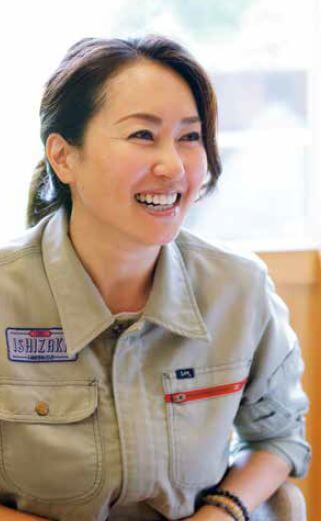
Ishizaka: It was the media uproar about dioxin in 1999 that inspired us to launch our activities to communicate with the general public. We were subjected to fierce criticism, and the local community even went as far as to demand that we leave the area. That was when I suddenly realized that, although my father had fervent aspirations when he founded the company, his ideas had not been communicated to the local community at all, which was such a wasted opportunity. It would have been better if he, as the founder, had communicated them himself but, like many skilled workers, he finds it hard to speak out proactively. That's why, when I inherited the position of president, I decided to communicate those ideas for him.
I've been lucky enough to be featured in the media but, going forward, I would like to encourage our employees to play a more visible role. Some have already appeared in the media and spoken about our company. I hope our employees participate actively, since being involved in work to communicate our stance furthers their own understanding of our company's social contribution.
Geshiro: You're right. When I hear employees talk about their company, it is filled with praise. Preparing to talk about their company is probably a good opportunity for them to deepen their understanding. I think it leads to a greater feeling of pride in their company and job.
Daifuku products are utilized in places such as factories and distribution centers and, unlike general consumer goods, we don't usually get to see how the systems we deliver are used. That's why we provide opportunities for employees at our manufacturing sites to visit customers' sites.
When they can see for themselves how our products help our customers, and can receive direct feedback from them, our employees get to know more of how they contribute to society through their work, which can help to boost their motivation. This can encourage them to tell their children about their work and how they contribute to society, even though most people are not aware of their role.
Ishizaka: Around 10 years ago I came up with the idea of installing a walkway for guided tours of the plant. It wasn't only because I wanted people from outside the company to find out more about us; I also wanted to boost employee motivation.
And now the plant attracts 40,000 visitors a year. I don't think anyone expected that to happen.
As we gained more fans in the local community
clients started to ask for us specifically
Geshiro: Our comprehensive exhibition hall is visited by elementary school students as part of their social studies field trips, as well as by vocational high school students and visitors from overseas. Seeing actual products dramatically boosts their level of understanding, and I hope their visit to our exhibition hall will inspire them to find out more about our business.
What kind of changes did you see inside your company after you started offering guided tours?
Ishizaka: The tours mean that our employees are watched by various people as they work, and I think that fact encourages them to think about how their work ought to be and to seek solutions.
Offering guided tours has had a beneficial impact on our business as well. Santome Konjaku Mura, established at the same time as the plant, has been designated as a site for environmental education and we offer a variety of programs. As the fans of this facility increased in number, so did the cases where clients specifically asked for us. Clients feel safer with a company that has many local fans, rather than one that is an unknown quantity, don't they?
In the past, when our salespeople went to see potential customers, they wouldn't even consider our company because they'd never heard of us. Nowadays our name comes up in many different places. The way I see it, offering guided tours is rather like bringing in external consultants.
The feedback we receive from people with a diverse range of values give us hints on how to improve our operations, and I feel that they help us to become even better. Multifaceted value can be gained from showing the internal workings of a company.
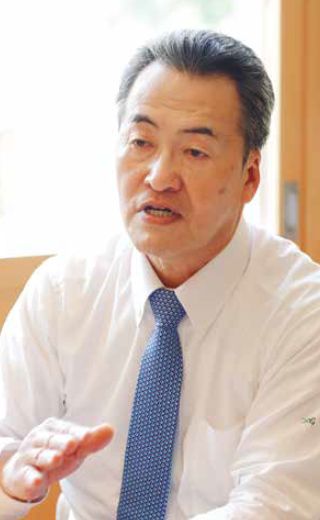
Geshiro: I was really impressed when I looked around your plant today. You've created your own configuration of the equipment and optimal processes needed to meticulously separate and recycle industrial waste. I was amazed at how you've not only created unique innovations but are also perfecting them without making any compromises or accepting something as "good enough."
Ishizaka: You can't enjoy your work without paying proper attention to the details, can you?
We treat waste matter and process it into materials for purposes such as surfacing, mulching, and fuel chips. We supply them as raw materials, so our employees don't get to see the finished product they are used in. I would like for them to take pride in the fact that they supply raw materials. Part of the fun of our work is imagining how the materials will be used.
The advent of AI will raise the quality of work in the near future. However, there are still fields where AI is unable to provide much benefit such as those that involve ideation and creativity.
Our corporate slogan is "Living beautifully with nature." I have my own answer as to what that means, but I want our employees to start by thinking of their own. I deliberately chose a phrase likely to be interpreted in various ways because I want each employee to think about it for themself.
Waste treatment is a global issue
We attempt to solve social issues via advanced technology
Geshiro: I hear that you're doing research to incorporate AI into waste treatment.
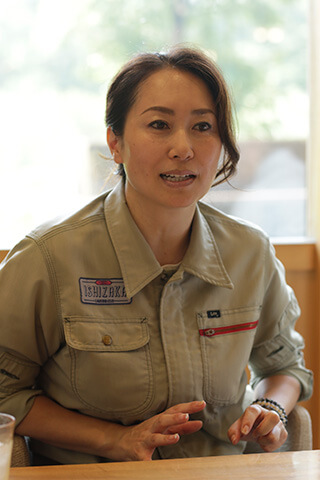
Ishizaka: The manufacturing industry handles standardized items, so it's easy to replace some of the equipment in a production process, but everything is completely different in the waste we handle: the materials, the shapes, and the weight. A high level of technology is required to determine how best to handle items that cannot be standardized. Our work would be dramatically transformed if the sorting of industrial waste could be mechanized, wouldn't it?
It's precisely because industrial waste is such a difficult industry that we need cutting-edge technology. Waste treatment is an issue all over the world, not just in Japan. There are children who collect garbage to make money, and cities with more garbage than they can hope to process. Someone has to find a solution for all this.
It's hugely expensive to research and develop the AI needed to clean up the vast amounts of waste discharged on a daily basis. This is a global issue, however, so it should also be a business opportunity. I'd really like people to pool their wisdom, not just us but also people from outside our industry. A rigorous industry like this really needs cutting-edge technology.
Although it's a tremendously difficult theme, our company is moving forward with some research and development. I don't think that our research will have the complete answer, but I do think it has the potential to be a catalyst for change.
Geshiro: In the logistics industry, it's possible for robots to do work such as loading products onto trucks because the products are standardized. When it comes to sorting, there's still plenty of scope for technical research in areas such as object recognition and manipulators (robotic hands and arms).
Your company would be using AI for industrial waste treatment, which doubtless raises even more difficult problems.
Ishizaka: Yes it does. The waste not only arrives in large volumes made up of a wide range of types and shapes, but it's brought in as a mass of items, not in a form that can be systematically laid out horizontally. AI capable of processing a vast amount of information is required to disentangle that mass then extract and separate items that are needed.
You can somewhat lighten the on-site workload using IoT operated heavy machinery. However I'd find it hard to invest billions of yen in such a small improvement. That's why we're looking at AI.
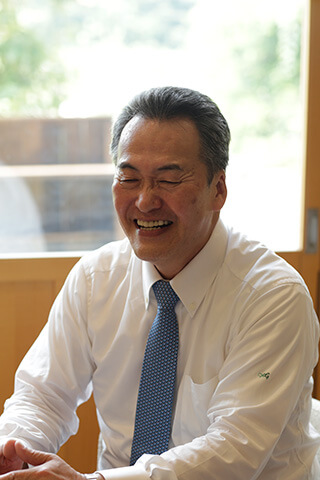
Geshiro: If AI can be put to practical use in the particularly complex and challenging field of industrial waste treatment, it can probably be applied in other fields as well
During my tour of your plant, I was shown a water tap that had been collected as waste. It was made of a combination of materials, such as aluminum and copper. Do you think AI will become capable of separating items like that?
Ishizaka: That will probably be achieved at some point. However, I think that there are two approaches to that challenge. One approach is to change the way things are made. There's a limit to how long we can continue to use finite resources, so we should design things right from the start to be easy to recycle. If possible, that would be the easiest solution.
The other approach is to create flawless AI. As you said earlier, that takes time and money. Which of those two options seems better? There are many things in our society that are convenient for us but have an adverse effect on the environment. That's why people in the industrial waste business should be included in discussions on topics such as circular economies (recycling-based economic systems that make efficient use of resources, including waste and unused assets) and the SDGs.
Plenty of hints on how to create a sustainable society can be found if we look at waste.
Geshiro: I was deeply impressed by your clear focus on the future and how you persevere with your efforts. Daifuku also engages in initiatives to solve the social issues of labor shortages and the need to reduce manual workloads. Our initiatives include providing high quality products and services, building good relations with the local community and society at large, and making a positive contribution to the environment via our corporate activities. I intend to leverage those initiatives and contribute to the creation of a sustainable society.
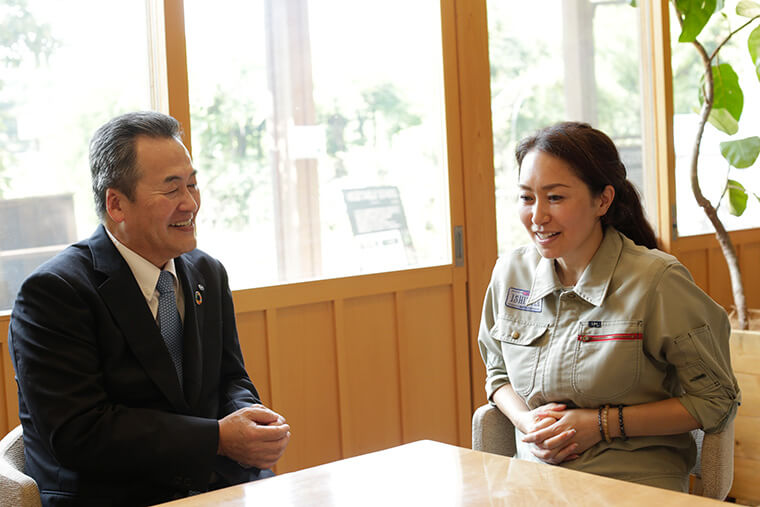
Noriko Ishizaka
Joined Ishizaka Inc. in 1992. Became president and CEO in 2002, and carried out various reforms such as adopting an integrated management system with seven types of ISO certification. Ishizaka Inc. acquired the Ecosystem Conservation Society-Japan's top JHEP (Japan Habitat Evaluation and Certification Program) rating of AAA in 2012 in recognition of its satoyama regeneration initiative. Has received many awards, including the 35th Special Commemorative Award and an Outstanding Management Award from the daily Nikkan Kogyo Shimbun, and a Management Award from Zaikai. Has two children.
- *This article is based on the content of "A Special Discussion" featured in DAIFUKU NEWS No. 225 (published in October 2019).
